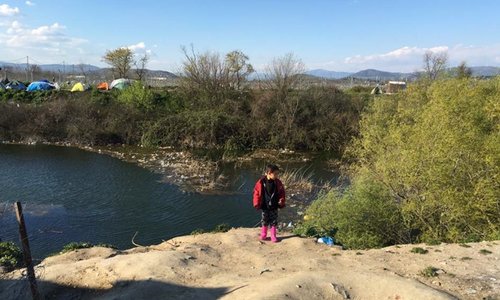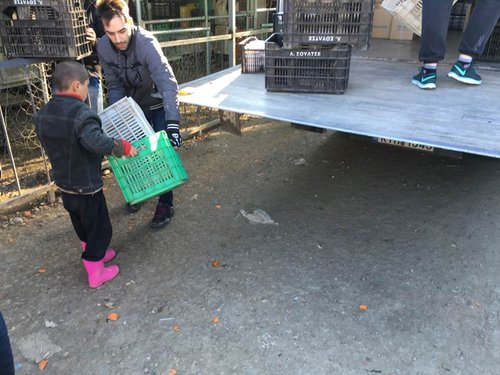Presbyterian Church Takes the Message Home
2016. április 14., csütörtökInternational partners from the Presbyterian Church (USA) recently visited the RCH on a trip to trace the path of refugees through Hungary, Greece, and Germany. Now, members of Myers Park Presbyterian Church in Charlotte, North Carolina are taking what they’ve learned back to America as they continue posting reflective pieces on their church’s new blog, Love Builds Up.
Returning home after a journey always brings a semblance of relief with it – back in your comfort zone, it’s easy to get back in a day-to-day routine and let the events of the rest of the world fade from view. After their recent trip to Hungary, however – as part of a larger journey to trace the path of refugees in Europe through Hungary, Greece, and Germany – members of Myers Park Presbyterian Church in Charlotte, North Carolina are doing all that they can to bring what they’ve learned on the continent back with them. Just days after reuniting with his family, E. Taylor Stukes wrote the following reflective piece about his time tracing the path of refugees and the “values crisis” that he sees happening around the world. The RCH is glad to have hosted the group during their time in Budapest and was pleased to facilitate meaningful dialogue with the Refugee Ministry throughout their stay. May we all read and reflect on this piece with love in our hearts and a continued openness to pursue further dialogue on this important topic.

I arrived to a different Charlotte than the one I left. I left bare trees, and now the trees are green. Grass is growing and flowers are blooming. I re-entered my life and quickly filled my time with emails and meetings, baths and bedtime stories. What I experienced in Europe began to move into the distance.
This Friday, my family and I were sharing a pizza and teaching my oldest son about April Fool’s Day jokes. We practiced silly jokes and hatched a plan to call his grandmother to trick her into believing he lost a tooth. My son began to riff on this theme, joking that he lost his pizza, his plate, and the kitchen table. And then, he joked that he lost his house. He joked that he lost his family. My thoughts fell back to Idomeni [in northern Greece, near the border of Macedonia].
I took the picture above of the boy in the pink boots in the makeshift camp in Idomeni. He was playing along the river, in front of the razor wire marking the border of Greece and Macedonia. Like the 12,000 other refugees in Idomeni, I know he lost his house. I wonder whether he lost his family. He is very likely to be traveling at least without his father. Because the human traffickers require a fee of $3,000 to $8,000 per person, many fathers went ahead to take the dangerous journey to Germany before the borders closed, relying on Europe’s family reunification policies to allow them to send for their families who would make the trip via regular transportation. But, under the strain, European nations are no longer honoring their policies. So, using the last of their savings, wives and children are making the desperate journey to meet their husbands and fathers. Many – tens of thousands, maybe more – children are traveling without any parents at all. The boy in the pink boots has lost. As a refugee child, he lost his safety, he lost shelter, he lost regular meals, he lost his education, he lost his innocent childhood. He will likely lose his freedom. He will likely be forced into a detention center, where he will await deportation to Turkey, where the world will lose sight of him.
Burkhard, our guide and a co-worker in central-eastern Europe, often remarked that Europe isn’t experiencing a refugee crisis, but a values crisis. He feared that Europe is losing its values by erecting razor wire fences, and turning away those families who fled their homes to save their lives. Beyond Europe, what does the world stand to lose by hardening our hearts and turning our backs on the most vulnerable people? People of good faith will say that we risk losing our safety if we admit large numbers of refugees. That is a legitimate concern, but only if we are willing to believe that our safety and our values are mutually exclusive. In a world captive to violence and greed, will we decide to surrender our values, hoping that sacrifice will protect us? I don’t think so because deep down we believe that our lives will be secured only if we courageously live out our values. Easier said than done, to be sure. But it can be done. Often, I politely conclude a conversation about a controversial topic by saying “It’s a difficult and complex issue.” But, I’ve found after my time in Europe along the path of the refugees that the phrase “it’s a difficult and complex issue” should not be a conclusion but an invitation. Here, it is an invitation to delve beyond the headlines and the politicians’ soundbites to help innocent people fleeing for their lives.

Above is another picture of a different boy in pink boots. I know he lost his house; he may have lost his family. The picture was taken outside a food distribution building at the Idomeni refugee camp. A truck had pulled up to drop off frozen vegetables. The boy came to the building alone. And he began to help by handing the food crates after they had been unloaded to the Doctors Without Borders worker. He could have stayed in his tent, he could have joined the other children playing. But he decided to help. He engaged in a difficult and complex issue. He will not solve it, but he will ease it. Although this boy has lost everything, his heart has not hardened. He does not turn his back on vulnerable people, although he is the most vulnerable. I don’t know what compelled this boy to help–maybe he was just looking for something to do. However, I suspect that he helped because his heart connected with a need and he decided, unconsciously, to live out his values in his simple way in a place of severe loss.
I can’t draw a grand conclusion from these pictures of boys in pink, obviously donated, boots. Although, I still feel their sadness borne of a life that they have lost. This is not a refugee crisis. It is a values crisis. This crisis is a difficult and complex issue, but it will not be solved by chain link, concrete and razor wire. It will not be solved by detention and deportation. It will not be solved by politicians appealing to our fears instead of our faith. I do not know what exactly is the solution to the crisis, but I think we–and the God-given values that we share–must be a part of it.
To read more blog posts from the group, you can visit Love Builds Up.
The original group that visited Hungary in late March was led by Heath Rada, the Moderator of the 221st General Assembly of the PCUSA, and also included his wife, Peggy Rada; Laurie Kraus, Presbyterian Disaster Assistance Coordinator; Burkhard Paetzold, Regional Liaison for Central Eastern Europe and the Roma; Derek Macleod, Associate Pastor of Outreach at Myers Park Presbyterian Church in Charlotte, North Carolina; and E. Taylor Stukes, an active and engaged member at Myers Park Presbyterian Church in Charlotte, North Carolina.
Edited by Kearstin Bailey
Contact us
Click here if you are interested in twinning.
Reformed Church in Hungary
Address: H-1146 Budapest, Abonyi utca 21.
PO Box: 1140 Budapest 70, Pf. 5
Email: oikumene@reformatus.hu
English, German and Korean language services in Budapest
Links
Recommended articles
-
Pastoral Letter in the Light of the Pandemic
Bishop Dr. István Szabó sent a pastoral letter of encouragement to the ministers serving in RCH’s congregations, expressing his gratitude for the persistence and creativity of the pastors.
-
RCH Joins in Pope's Call for Prayer
RCH published the call on congregations to join the initiative of Pope Francis, supported by ecumenical organisations, to unite in praying the Lord’s Prayer on Wednesday, 25 March, at noon.
-
English Speaking Worship Services Online
Each Sunday at 11 AM (CET) the St. Columba's Church of Scotland in Budapest, the international community of RCH invites you to join the worpship service on its facebook page.
-
Test of Humanity and Companionship
Reformatus.hu asked Dr. György Velkey, Director General of the Bethesda Children’s Hospital of RCH about the challenges of health care workers and ways of prevention against the pandemic.
-
All Church Events Suspended
In light of the coronavirus the Presidium of RCH requested congregations to suspend all church events with immediate effect. Beside restrictions, it calls for prayer, sobriety and responsibility.











